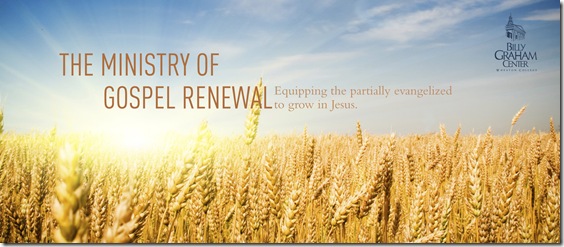Centerline, a publication of the Billy Graham Center, recently interviewed me on the Ministry of Gospel Renewal. For those who don’t receive Centerline, here it is:
Tell me a little about your background—where you grew up, previous work, family, etc.
Think of Buddy Valastro of the reality television series, Cake Boss, or any other Italian American character from the East Coast and you’ll have a picture of my background. It was boisterous, fervent, emotional, and warmhearted, with a strong love for music and food. These cose all’italiana (qualities of being Italian) were probably noticeable to outsiders; but to those of us raised on Long Island, New York, it was the air that we breathed. As for my work, it was everything from telephone repairman in Manhattan, professional fundraiser in the Catholic Church, to driving limousines during seminary. Family consists of two loving parents, a younger sister, and a lot of cousins who wear pinky rings.
Tell me about your religious background and how you came to true faith in Christ.
I loved growing up Catholic. I loved the grandeur of the sanctuary with its carved wood, arched windows, and stained glass. I loved the deep, resonate amalgam of voices confessing the Nicene Creed and the honesty and humility expressed in the kyrie: “Lord, have mercy; Christ, have mercy; Lord, have mercy.” I loved memories of simple things, like braiding cruciform-shaped palm leaves for Easter.
Unfortunately, I never heard the gospel when I was a child. It drives my Catholic friends crazy when I say that. I’m sure that Jesus’ death and resurrection was communicated in my local parish (after all, it is in the liturgy). But the lights didn’t turn on until I was age 23. During a tough season of life, after Dad had suffered a severe heart attack, I visited an evangelical church and heard a clear presentation of the gospel. I finally understood the meaning of Jesus’ cross and resurrection—that the Lamb of God had died in my place, not simply as an offering for “sin,” in a general sense, but for me personally. Not Christ accruing superabundant merits to be stored in a heavenly treasury and dispensed to me as I participated in sacramental rites, but the complete satisfaction of God’s wrath and forgiveness of my sins. This was the turning point of my faith and life.
What is a “partially evangelized” person? Tell me how and why you came to be so passionate about interacting with people who fall into this category.
The “partially evangelized” refers to men and women who have some connection to the church, but for whom the gospel is absent or at best unclear. In this context, the word “gospel” is defined as the new birth, reliance on Scripture, and a concern for evangelism. According to the Pew Forum, the US has 99 million such people in Mainline Protestant, Catholic, and Eastern Orthodox traditions (if you were to add partially evangelized from so called evangelical churches, the number would be much higher). The Ministry of Gospel Renewal seeks to provide evangelicals with the requisite training and tools for engagement with partially evangelized persons, connecting the dots between the life-giving message of Christ and the millions of people who have yet to be been transformed by it.
My passion for interacting with others in this category is probably an outgrowth of my personal experience. After being partially evangelized for 23 years, I am eager to serve the process in which God turn the lights on for the millions of men and women who remain in the darkness of nominal faith.
What are key issues/topics you deal with in training evangelicals to reach partially evangelized people?
Because God has given his church the greatest message in the world, we, of all people, should be the finest communicators. Unfortunately, due to a dearth of attention and training, most evangelicals are unable to clearly articulate their faith.
According to a recent National Barna Survey, only 55% of American adults who identify as “Born Again” have actually shared their faith in the last twelve months. Among this 55%, those who feel competent in doing so are miniscule. Herein is the particular need that we wish to address: to help evangelicals relate the gospel in ways that are winsome, relevant, and compelling.
There are three particular places where a need for this ministry is most acute: in families, the workplace, and on college campuses. The particular issues that we face in these contexts are generally the same. They include understanding the gospel message itself, the distinctive cultural traits of people with whom we speak, their assumptions, priorities, and worldviews, and practical matters such as how to raise poignant questions that elucidate gospel truth.
What do you envision for the MGR?
There are several ways that Gospel Renewal is poised to offer training: through workshops, leadership coaching, church seminars, conferences, retreats, and various forms of media such as my blog, books, and podcasts. We are completing an online curriculum project. This resource, available on my website (ministryofgospelrenewal.net), will assist Sunday school communities, small groups, and the like in the activity of engaging partially evangelized friends and loved ones. The website also contains articles and videos on the topic of gospel renewal; if you’re there, please introduce yourself through the email link.
What is now only a trickle of Christian identity, God desires to make a deep river of faith (Ezekiel 47); what is a small cloud, God wishes to develop into a torrential rain (1 Kings 18:44); what is a modest-sized lunch, God will multiply a thousand times over into a feast (John 6). The Ministry of Gospel Renewal exists for this purpose, to see partially evangelized men and women across our land converted, embracing Scripture, and engaged in gospel outreach as fully devoted followers of the Lord Jesus Christ.





